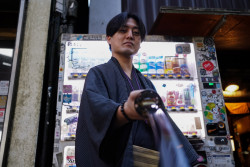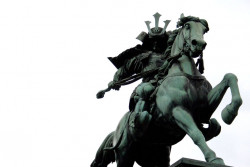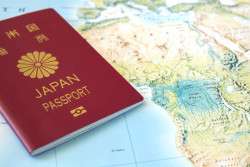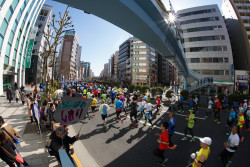
Originally published on metropolis.co.jp on December 2013

“I’m still atoning,” says Takayuki Niinuma. This is the man who gave up his possessions and underground Kabukicho life to head back to Ofunato after the earthquake and take care of his family—a wife and child he had been living apart from for six years [www.meturl.com/badass]. He also threw himself into bringing light—literally—to those throughout Tohoku who 18-months post-disaster still had no electricity, installing solar panels in homes and community centers. “I’ve got a long way to go before I can forgive myself for the crap I did.”
When the tornadoes hit Chiba and Saitama this past July, Taka hit the road, driving through the night to find those who needed help.
“I get it,” he tells me. “I get their pain. I know what it’s like to lose everything. This is also a way for me to say ‘thanks’ to those who helped us after the disaster that hit us. We need to start giving back. The only way I can do that is to show up.”
Taka’s desire to offer assistance and express gratitude is not limited to Japan. “We got all this aid from people everywhere. I should go help them if they need it, wherever they are.” Long ago, Taka and I had the discussion about how most immigration officials overseas would take one look at his tattoos and refuse him entry. “I’d get stuck in one of those small interrogation rooms, foreign cops trying to get me to say I’m a yakuza guy when I’m not. I’m inked, yeah, but I’m not one of them.” He laughs and I join in, but it’s not funny.
He was on the road again when the typhoon struck the outskirts of Kyoto. “I’m going to keep doing this,” he wrote on his Facebook wall. “I’m serious. I’m all in. This is the only way I know how to say thanks and help others at the same time.”
He’s connected with others doing similar work, and he’s proud he’s not the only one from Tohoku who shows up at disaster sites. “If it were just me and a few other people who showed up to do what the locals need done and say thanks for the support they gave us—I’d be pretty pissed. That’s not the case. I’m not alone. Tohoku is filled with people who want to give back.”
One post on Taka’s Facebook wall last week made me scroll up and read it again. I pulled out my glasses to be sure I wasn’t misreading.
“We received a call from a local family,” he begins, “who asked us to search the area for their missing daughter.”
I’m speechless. This was in Iwate after the typhoon hit in late October. Is this for real?
“The police and firefighters ended their search, so the family came to us. We’re going. Come and help but only if you’re serious. Bring your own gear.” He gives the location, says it’s likely more dangerous than a lot of people are comfortable with, and repeats the caution: “Come only if you’re sure you won’t be in the way.”
For a few days, there was no activity on his wall. Then it comes. Taka posts a photo of a bouquet of flowers and a bottle of green tea. He wrote, “Just a bit longer. You’re almost home.”
They found her. A group of ragtag men from Tohoku who arrived on the doorsteps of strangers, offering their services, have done the unthinkable: they brought back a beloved for burial. They cried with the family, offering up the right words—words that only those who have been through it have. Tohoku aid came full circle, giving back to the grieving a pained comfort that comes from deep in the soul.
I called Taka. “Good for you,” I say. “Are you okay?”
“Yeah.”
“You need anything?”
Here, Taka pauses.
“Gas money,” he says. “I need to be able to do this again.”







